
Harry "Sweets" Edison was an American jazz trumpeter and a member of the Count Basie Orchestra. His most important contribution was as a Hollywood studio musician, whose muted trumpet can be heard backing singers, most notably Frank Sinatra.
Charles Phillip Thompson was an American swing and bebop pianist, organist, composer, and arranger.

Al Grey was an American jazz trombonist who was a member of the Count Basie orchestra. He was known for his plunger mute technique and wrote an instructional book in 1987 called Plunger Techniques.
Joseph Dwight Newman was an American jazz trumpeter, composer, and educator, best known as a musician who worked with Count Basie during two periods.
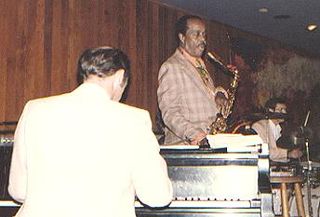
George Holmes "Buddy" Tate was an American jazz saxophonist and clarinetist.
James "Osie" Johnson was a jazz drummer, arranger and singer.
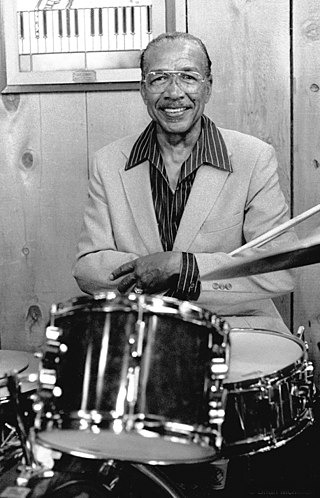
Gus Johnson was an American swing drummer in various jazz bands, born in Tyler, Texas, United States. After learning to play drums from his next-door neighbor, Johnson occasionally played professionally at the age of ten in the Lincoln Theater, and performed in various local groups, most notable McDavid's Blue Rhythm Band. Upon graduating from Booker T. Washington High School, Johnson moved to Kansas City, where he took up drumming full-time. He joined Jay McShann's Orchestra in 1938, with his music career being interrupted by his conscription into the military in 1943.
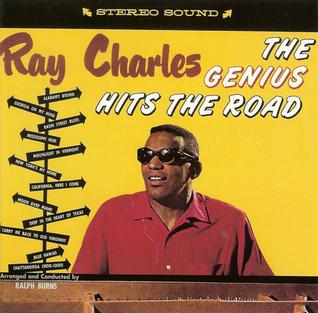
The Genius Hits the Road is a 1960 album by Ray Charles. The concept album focuses on songs written about various parts of the United States. It peaked at number nine on the pop album charts and produced a US #1 single, "Georgia on My Mind".

The Hottest New Group in Jazz, also known by its full title Lambert, Hendricks, & Ross!: "The Hottest New Group in Jazz" or alternatively considered self-titled, is the fourth album by Lambert, Hendricks & Ross, released in 1960. The title is a quote from Downbeat magazine. The CD reissue combines the full original album with the group's two other Columbia albums: the 1961 LP Lambert, Hendricks & Ross Sing Ellington and the 1962 LP High Flying. The CD release additionally includes seven previously unreleased "rarities", recorded in 1962. On all these recordings, the group is backed up by the Ike Isaacs Trio.
Matthew Gee was an American bebop trombonist.
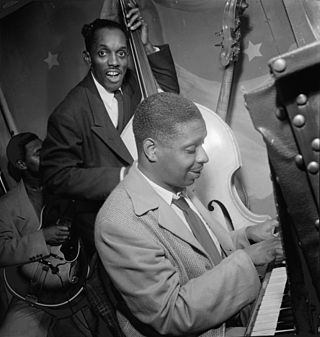
James Henry Jones was an American jazz pianist and arranger.
Black & Blue Records was a record company and label founded in France in 1968 that specialized in blues and jazz.

Krupa and Rich is a 1956 studio album by jazz drummers Gene Krupa and Buddy Rich, released on Norman Granz' Clef Records. Krupa and Rich play on two different tracks each and play together only on "Bernie's Tune." Krupa and Rich would record again for Verve Records; their album Burnin' Beat was released in 1962.

Afro/American Sketches is a jazz album by Oliver Nelson recorded in late 1961 and released in 1962. It is his first big band album as a leader.

The Wailing Buddy Rich is an album by jazz drummer Buddy Rich, released in 1955 on Norgran Records. The first two tracks were recorded on May 16, 1955, in New York; the remaining tracks were recorded with different personnel in Los Angeles on August 26.

Memphis Jackson is an album by American jazz vibraphonist Milt Jackson featuring performances with the Ray Brown Big Band recorded in 1969 for the Impulse! label.

Madison Time is an album recorded by American jazz pianist Ray Bryant recorded in 1959 and 1960 for the Columbia label. The album was released following the success of the Madison dance craze single "The Madison Time" which reached number 30 on the Billboard chart and number 5 on the R&B chart. The single also featured in the soundtrack to the 1988 film Hairspray.
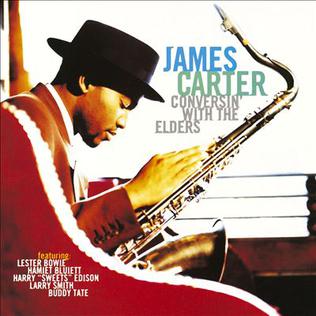
Conversin' with the Elders is the fourth album by saxophonist James Carter recorded in late 1995 and early 1996 and released on the Atlantic label. The album features guest appearances by veteran musicians, including trumpeters Harry "Sweets" Edison and Lester Bowie, and saxophonists Hamiet Bluiett, Larry Smith and Buddy Tate.
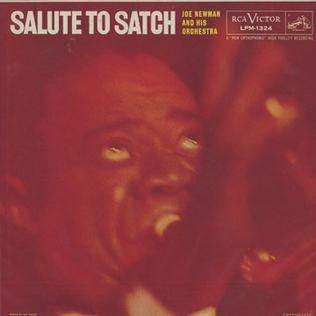
Salute to Satch is a tribute album to Louis Armstong by jazz trumpeter Joe Newman and His Orchestra recorded in 1956 for the RCA Victor label.

Things Ain't What They Used to Be is an album by the First Annual Prestige Swing Festival featuring two all-star groups, one including Coleman Hawkins, Hilton Jefferson, Jimmy Hamilton and Joe Newman and the other led by Al Sears with Buddy Tate, Pee Wee Russell and Joe Thomas which was recorded in 1961 and first released on the Swingville label as a double album before being reissued as two single discs with Hawkin's name displayed prominently; Things Ain't What They Used to Be and Years Ago. All tracks were also reissued as Jam Session in Swingville which was credited to Hawkins and Russell.















